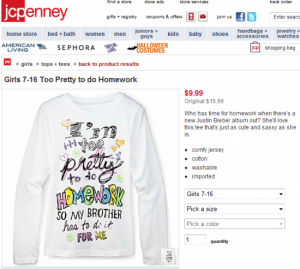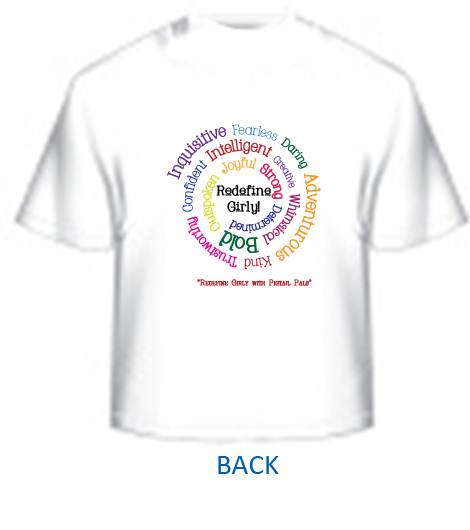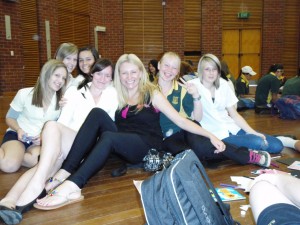Interviewer: Dannielle thank you for talking to us tonight in our live online chat room.
Dannielle Miller: It’s a pleasure to be here.
Effie asks: Hi Dannielle. Have you been getting a lot of support with schools on your program?
I think you are doing wonderful work and want to wish you all the best in your success.
Dannielle Miller: Thank you for your kind words. Our programme has been very well received. We founded the business 3 years ago in NSW and started with just 3 schools and now have more than 60 we work with nationally. Last year we also won Australian Small Business of the year for Children. We are of course very proud of this but it would also be lovely not to be so needed. The reality is that our girls are in crisis. We are very pleased that so many educators now acknowledge they are responsible for the whole person. We believe that girls cannot achieve their personal and academic potential if they are pre-occupied with body image and self-esteem issues.
Anthea asks: Do you have any funding for your program, where are you taking it to at the moment?
Dannielle Miller: We deliberately set the business up to be non-commercial so do not receive funding support from any entity. Nor do we receive Govt support at this point in time, however disadvantaged schools in Western Sydney have had our programmes subsidised and we have been achieving outstanding results with girls in these schools. Our programmes range from $30 to $45 per girl and in the majority of cases schools would ask parents to pay this. It was important to us to maintain the integrity of the work rather than accept corporate sponsorship.
Outraged asks: Danielle, how much does the ‘male gaze’ impact on media, given that many photographers, cameramen and advertising execs are men?
Dannielle Miller: Good question. I have not looked closely in this area however it would seem quite likely that the male gaze would impact on the way women are presented. It is important to note that many editors of teen girl magazines that do not always present positive images and role models are women. Quite often women are subject to the very same pressures and also want to conform to societies expectations. There is pressure on us all to be hot, hot, hot.
awol78 asks: I think the real issue – beyond the paedophilic angle – is the long term affects that this is having on our young people themselves. Low self esteem, eating disorders, cosmetic surgery… And… let’s target the real culprits here – beyond your Jessica Simpson’s, your Paris Hilton’s… Where is this sexualized culture coming from? The whole size zero phenomenon..? It’s the advertisers at the top. Sex sells – and nothing will ever change that. So well done on these programs – we need more in schools… Is there anything for BOYS and YOUNG MEN..?
It has become a big issue for males now too!
Dannielle Miller: Your are absolutely right in suggesting that we need to be concerned about so much more than just the way in which paedophiles may or may not view these images. In fact that is not a focus of our work at all, rather we focus very much on how girls view themselves as a result of being exposed to our toxic culture.
Yes, girls are suffering from eating disorders. Yes, self harm is on the increase. Yes, girls are binge drinking. Any concerned parent or educator would have to start questioning the messages they are bombarded with. Our programme is strength based which means that we affirm the knowledge the girls already have and more than that we provide them with the tools they need to unpack our adult society.
There are many excellent resources out there because we are by no means a voice in the wilderness. I would highly recommend accessing my blog where I post weekly reports and resources. Kids free to be kids, who were also profiled in the 60 Minutes story, do some wonderful work in this area as well. Women’s Forum Australia also have a publication entitled “Faking It” which does a tremendous job of combining the research on the sexualisation and objectification of women’s bodies with a highly readable approach.
We need to actively seek a variety of tools and programmes that can be powerful voices of difference. As for your query as to what is out there for young men, I would have to say that I’m not aware of a similar programme that operates in schools targeting these issues. However, I would agree that boys also do need to presented with programs that enhance media literacy and emotional literacy.
IceKat asks: I’m curious as to what age you run your courses for? How young is too young?
Dannielle Miller: Our programmes are designed to be delivered in high school with girls aged 12 to 18. However this year I have had a number of primary schools ask me to work with their 11 to 12 yr old girls in Year 6. These schools are saying to me, self-esteem and body image issues are creeping into their playgrounds too. I applaud principals who want to be proactive.
The school executive at the primary school I was filmed working with on 60 Minutes, said to me quite clearly that they did not want to wait until their little girls were in trouble. They did not want me coming in to fix a problem, rather they wanted me to come in and help prevent a problem.
I think it is important to instil in all children from a young age a strong sense of self and give them age appropriate information on their emerging sexuality. The key word there, is age appropriate. My little girl who is 10, knows all about air brushing, photo shopping, and is encouraged to question images of girls and women that are not positive. I do not however even expose her to many of the highly sexualised songs, film clips etc because I am in no hurry to steal her childhood.
9girl asks: Are you breeding little feminists though?
Dannielle Miller: I hope so !!!! Perhaps this question implies there is something wrong with that?
To me feminism has always been very much about respecting and honouring women, and recognising that they deserve equality. It is easy for us to become complacent about women’s issues as in many ways we have made so much progress, yet surely when we look at the Pussycat Dolls and the magazine filled with wrinkle creams, images of Paris Hilton and Co. and diets, we can all see there is still work to do.
ShellyK13 asks: What can we as parents and myself as a teacher do to combat the barrage of sexual images and innuendo that our kids deal with every day?
Dannielle Miller: Again, I would encourage you to hook into some of the excellent resources that are out there. On my blog https://enlighteneducation.edublogs.org I have gathered some amazing resources and also have a professional library. In a practical sense the following ideas may also prove helpful:
1. Talk to your daughter honestly and non judgementally about sex and her own sexuality.
2. Be a positive role-model.
I am actually writing a book for mothers at the moment.
3. Tell your daughter you love her for who she is not how she looks.
4. Offer positive alternatives by that I mean magazines, books and websites that offer positive images of women and sexuality.
5. Speak up! I love that Julie Gale song from Kids Free to be Kids, write to companies that sexualise children and tell them to back off !
Companies will only make hype-sexualised toys and merchandise if we continue to buy these things.
kenny78 asks: Shouldn’t the parents of any child have the right to view these pictures prior to them hitting the print. Surely a parent would have enough sense to be able to tell whether something is going to look too provocative?
Dannielle Miller: Parents do have the right to view images of their children before they go to print. You would hope therefore that they would make the right choices. I must also stress, that some children are very vulnerable and do not have adults around them that make good choices. As a society we need to protect children by setting our own standards as well.
savethegirls asks: When do we stop blaming society and media and start taking responsibility for how we, as parents raise our kids? Sure, it’s hard when they are constantly being bombarded with these messages, but as caregivers we are the ones the buy into it all as well, by buying the clothes, magazines and not controlling their access to harmful media.
Dannielle Miller: I would agree with you, that as parents we need to set boundaries absolutely. However, as I mentioned above, not all parents are necessarily good at doing this for a number of reasons, which means that as a society we also need to set our own community boundaries and standards. I think also that as parents, even if we are incredibly well intentioned there is so much that is simply beyond our control.
We know that with teen girls, the peer group is incredibly powerful, this is why we work in schools with a full year group of girls so that all the girls hear the same messages, and decide themselves which boundaries they set and support each other and develop a sense of sisterhood. Yes it is important that parents don’t fall into the trap of trying to be “too cool” or their child’s best friend. Our children need us to step up but they also need to have some reprise from the more toxic elements of popular culture that really are engulfing us all.
ramsay asks: There is validity in educating children in awareness of paedophiles and dangers, but do you think your education techniques go too far and encourage children to single out others who are not ashamed of their bodies and ware bikinis etc (Children in mid to late teens) I do.
Dannielle Miller: You are mistaken. Perhaps the way the story was edited has let you to think we talk to children about paedophiles or the dangers of wearing swimming costumes or posing proactively. We do none of this. I want to be very clear here, we would never make children feel ashamed of their bodies or their sexuality. Rather our programmes are very celebratory.
jessica.ann asks: Have you re-visited any of the girls that you have spoken too later in their teens to see the effects of the ‘programme’?
Dannielle Miller: Yes we have. Evaluation is very important to us, we ask the girls for their feedback at the end of each event and it’s always outstanding. We also ask the schools 6 to 8 weeks later to provide us with more detailed feedback. Many schools have us work with the girls each year so we definitely get the chance to speak to them and hear how they are progressing. If you are interested in reading some of this feedback and looking at some of the statistics do visit our website http://enlighteneducation.com . Girls also write me lovely letters and send me emails. It’s incredibly rewarding to know that we are making a difference.
AustAccom asks: The only way the media will change is by having the laws changed re censorship and sexualisation of children and normalising these images in society do you agree ?
Dannielle Miller: Yes. Self-regulation obviously hasn’t worked. I am hoping that the Senate Enquiry will encourage some changes. Society has reached tipping point, I think the moral majority will send a very clear message to Canberra that we have all had enough.
Corrinne asks: You spoke a lot about the media as a major influence on teens, I was just interested in what other factors you believe have a significant impact on young girls/’tweens’?
e.g. peers, family interaction levels
Dannielle Miller: There are a number of things that impact on teen girls and our programme is very diverse. 60 Minutes focused on our discussion of the media and dolls as these elements were the most appropriate given the excellent story they put together. We also help girls deal with their friendships, we talk to girls about setting boundaries in relationships, about managing stress, handling academic workload … really, we recognise that young women are multi-facetted.
Pixel asks: Hi Danielle, what is your advice for a 12 yr old who wants to be 15 tomorrow ?
Dannielle Miller: Good question. It’s sad isn’t it that young girls are in such a hurry to grow up. Although I would tell her to enjoy her childhood she probably wouldn’t listen. I know however that by creating a unique experience like what we do in our programmes we can encourage our young people to slow down.
We have a generation of young women dealing with adult problems whilst they only have childlike strategy to fall back on. I guess if it was my little girl I would do all I could to encourage her to revel in her childhood. Sorry I probably haven’t been overly helpful because really that’s the 6 Million Dollar question isn’t it.
sbelly18 asks: There are too many worries for kids, they are not allowed to just be “kids” anymore. No playing with dolls or climbing trees. It’s not acceptable for young ones, and they will be teased and tormented for it now. Do you agree?
Dannielle Miller: Yes. There are a number of reasons why childhood is disappearing. I also think that as much as I love technology it too, can be a grinch that steals innocence. Our children are often spending more time online than they are exploring face to face real relationships. I’m not being a luddite here, just realistic.
Teen girls tell me that they are “wired” pretty much 24/7, many even sleep with their mobile phone by their bed. Where is the downtime? The dreaming time? I also think that many parents over-schedule their children. Do our kids really need so many activities? So many formally organised play dates? Do they all have to be genius’s?
There is great value in the simple act of play. I know that as a little girl I spent a lot of time organising all the children in my neighbourhood, running clubs, and generally being a bossy little miss! In hindsight it was all great practise for running my own company.
Angela asks: Hi Danielle I have a 10 year old daughter that says she is sick and can’t eat dinner, Dr’s won’t do anything, I don’t know where to get help?
Dannielle Miller: I have to say up front that I’m an educator not a doctor. I would suggest if you are concerned (and you should be), you seek out a doctor who is more understanding. Sadly girls as young as 8 are being hospitalised for eating disorders. I’m not suggesting necessarily your daughter has an eating disorder but it is wise for us all to be vigilant. There are other organisations that specialise in this area like the Butterfly Foundation who may be worth tapping into. Links to them and to other expert mental health practitioners are available on my blog.
Shellreyn asks: Danielle, do you have any advice on how I should educate my young son with regard to appropriate behaviour towards these young girls, when he’s being bombarded by media images of sexualised pre teens?
Dannielle Miller: I hear you ! I have a 6 yr old little boy who loves to chant “boom chicka wawa” which is the jingle from the lynx aftershave commercial. This series of commercials is just vile ! I get so furious that our boys are being encouraged to view girls as eye candy. I have found that I need to be quite clear with my son about what my expectations are.
I also take the time out to talk to him about why saying things that may seem harmless really can be quite hurtful. I think as mums we also need to role-model for our boys what strong confident look like. Again, we should not buy into hyper-sexualised goods and services. I try and find alternative women that he can really admire for example, he now looks up to Princess Leia from Starwars, Wonder Woman and loves to be my little scout seeking out songs, dolls and adds that he thinks “aren’t nice to girls”.
AngelEyes asks: Can I ask by keeping our daughters away from all of the songs, mags etc do you think they may be in danger of rebelling and becoming more like the Paris’s of the world?
Dannielle Miller: We simply can’t keep our girls away from all this. I would never suggest locking girls in the tower. What we can do is give them the critical thinking skills that can help them unpack and make sense of all the messages that are presented to them. Research clearly shows that education and information will not encourage rebellion. I am not a prudish person and our programme certainly does not aim to shelter girls, rather it equips them to be savvy media navigators.
Interviewer: Unfortunately we are out of time, there were so many questions that could not be answered. Thank you very much for joining us tonight.
Dannielle Miller: I would like to thank all those who asked questions, debate and questioning is essential. I hope that the community interest and concern for this important issue is maintained. Love, light and laughter to you all … Danni
Interviewer: Once again thank you and goodnight.









 When the news hit that an American child beauty pageant company, Universal Royalty, is holding a pageant in Melbourne in July, I was amongst the many thousands of people who felt sickened—not just by the images of little girls being blatantly adultified and sexualised in these pageants but also by the fact that such a beauty competition for children would even have a market here in Australia.
When the news hit that an American child beauty pageant company, Universal Royalty, is holding a pageant in Melbourne in July, I was amongst the many thousands of people who felt sickened—not just by the images of little girls being blatantly adultified and sexualised in these pageants but also by the fact that such a beauty competition for children would even have a market here in Australia. Catherine Manning is an
Catherine Manning is an 










